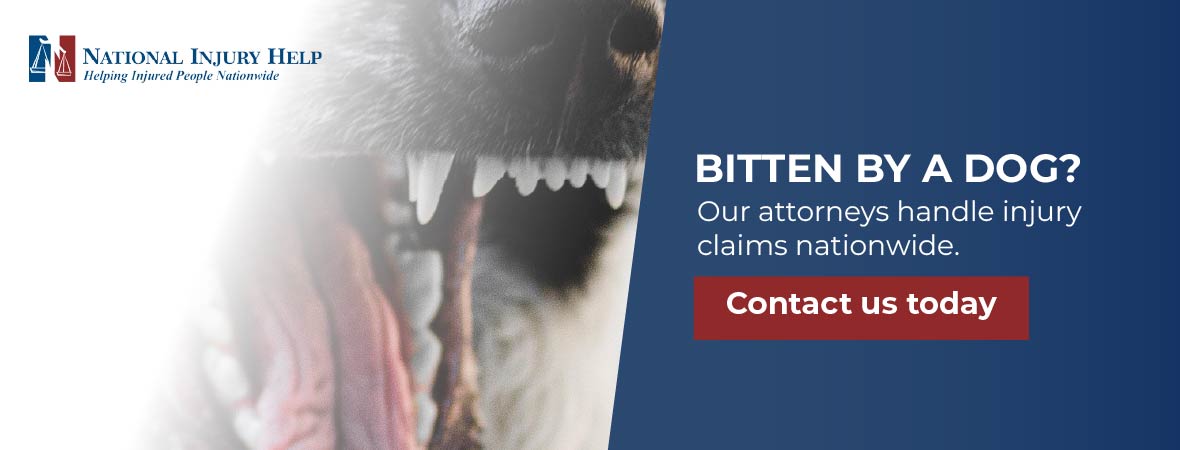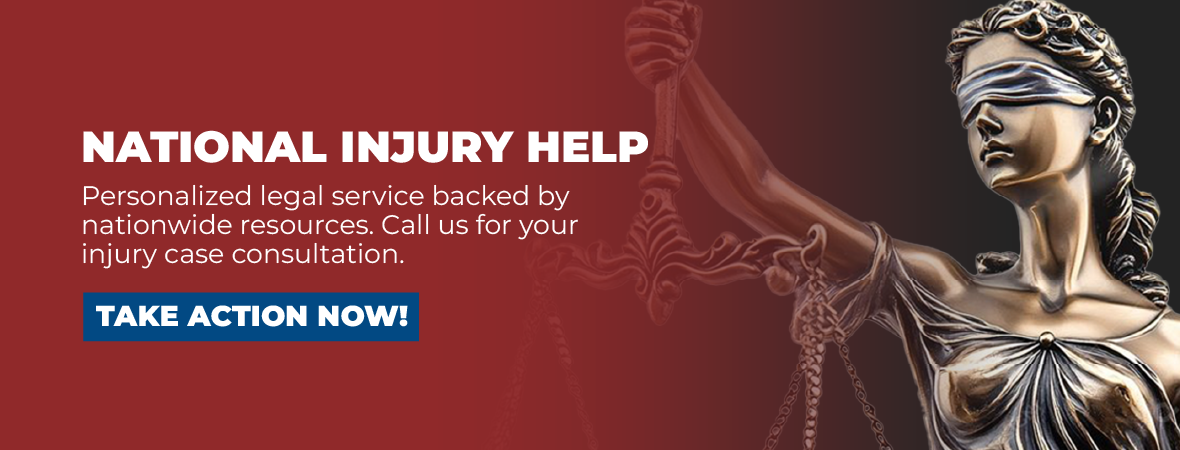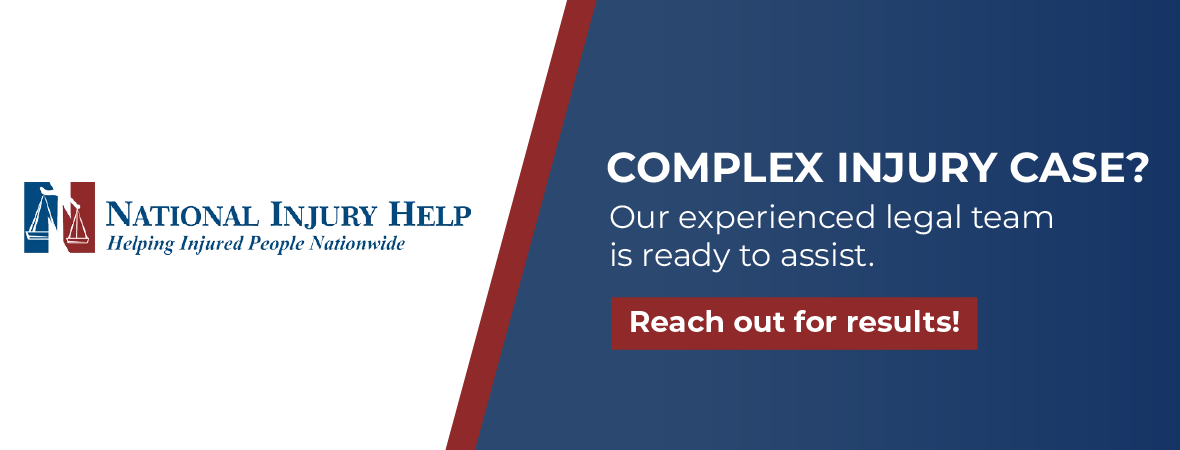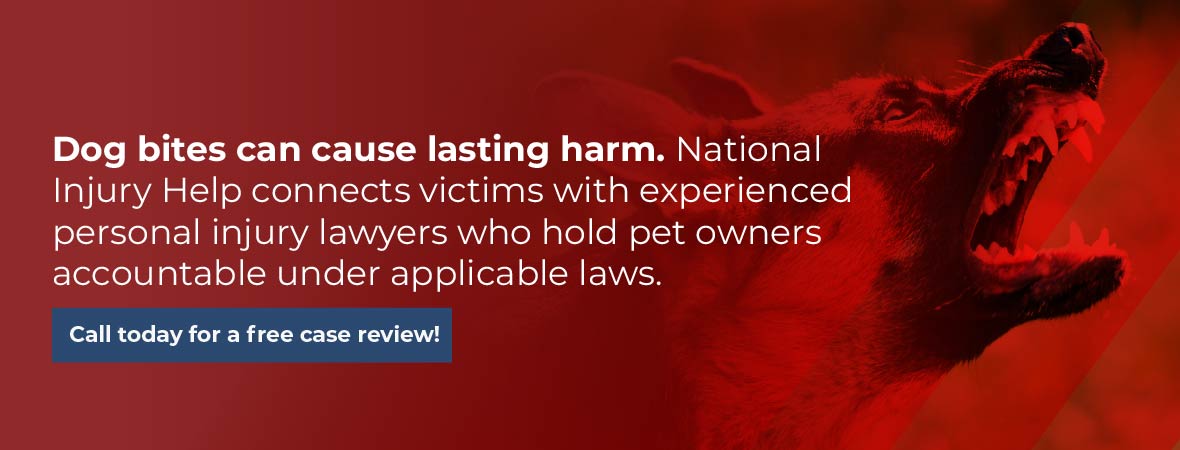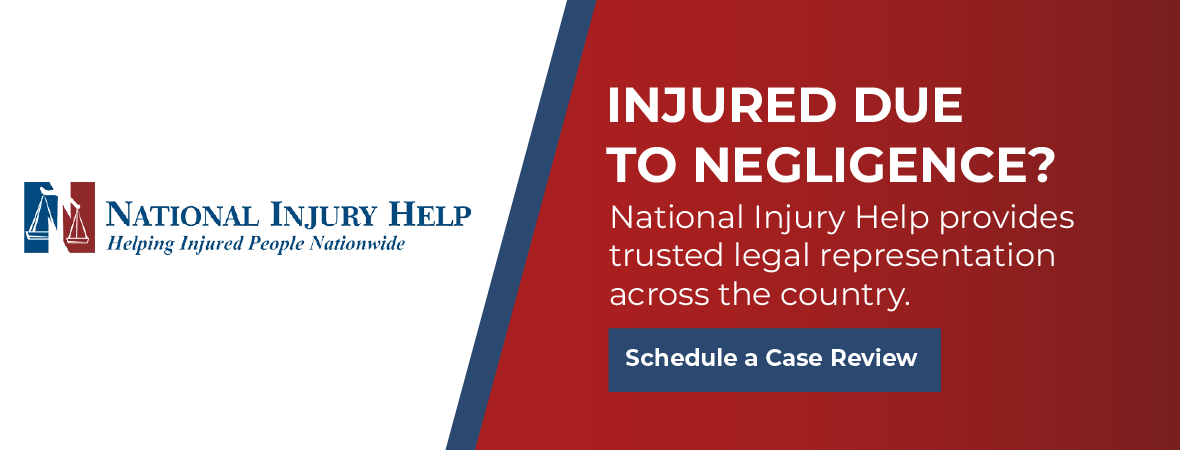Dog bites can lead to painful injuries, infections, and emotional trauma. Contact National Injury Help today by calling 1 (800) 214-1010. We will make sure the owner is held responsible and fight for the compensation you deserve.
A dog attack can happen in seconds. One moment you are walking down the street, delivering a package, or visiting someone’s home. Next, you are struggling against teeth and claws, completely caught off guard. Dog bites leave more than just physical wounds. They bring emotional scars, mounting medical bills, and lasting disruption to your everyday life.
Victims of dog attacks often require emergency care, stitches, surgery, and months of follow-up treatments. In some cases, there are permanent scars or nerve damage. For many, the trauma does not stop after the bite. Adults and children alike can develop a fear of dogs, suffer from nightmares, or avoid places where they used to feel safe. Work becomes difficult, and parents often find themselves dealing with emotional and psychological fallout when their child has been injured.
Fortunately, the law provides protection. If you or someone you love has been bitten or attacked by a dog, you may have the right to file a dog bite injury claim and recover financial compensation.
Dog Bite Laws in the United States
When a dog attack occurs, questions of legal responsibility often follow. But here’s where it can get complicated: dog bite laws are not the same in every state. Each state has its own rules for determining when a dog owner or another party is legally responsible for a bite.
Although state laws vary in the details, most follow one of two basic models when it comes to determining legal responsibility for dog bites: strict liability or negligence-based rules.
Strict Liability States
In states that follow the strict liability model, dog owners are legally responsible for most injuries their dogs cause, regardless of whether the dog has shown any previous signs of aggression. The victim does not need to prove that the owner was careless or negligent. It also does not matter whether the dog has ever bitten someone before.
Under strict liability, the law focuses on just a few key questions:
- Did the dog bite the victim?
- Was the victim lawfully present at the location where the bite occurred?
If the answer to both questions is yes, then the owner is typically held liable. That means the victim may be entitled to compensation for medical bills, lost wages, pain and suffering, or other damages.
This approach simplifies the legal process for victims. It removes the burden of proving that the dog had a history of dangerous behavior or that the owner failed to prevent the attack. If someone is bitten in a public place or while legally visiting private property, the owner is usually held accountable.
States that follow strict liability rules include California, Florida, Michigan, Illinois, and several others. However, even in these states, there may be exceptions. For example, the owner might not be liable if the victim was trespassing, provoking the dog, or committing a crime at the time of the attack.
Negligence-Based or “One-Bite Rule” States
Other states take a more cautious approach and apply what is often called the “one-bite rule.” In these states, a dog owner is not automatically responsible the first time their dog bites someone. Instead, the law requires proof that the owner knew or should have known that their dog had aggressive tendencies.
This does not mean the dog must have bitten someone before, but prior aggressive behavior, such as growling, lunging, or snapping, may be enough to show that the owner should have taken steps to prevent future attacks. If a dog has acted dangerously in the past, and the owner failed to take precautions, they can be found legally responsible.
To succeed in a negligence-based claim, a victim generally needs to prove the following:
- The dog had a history of aggression or had previously bitten someone.
- The owner was aware, or should have been aware, of that behavior.
- The owner failed to take reasonable action to prevent the attack.
Negligence-based rules can make legal cases more complex, as victims must gather more evidence to prove liability. These states tend to protect dog owners more than victims, especially in cases where the attack was truly unexpected. States that use this model include New York, Texas, Virginia, and others.
Who Can Be Held Responsible for a Dog Bite?
In a canine attack lawsuit, the primary person held responsible is the dog’s owner. However, depending on the situation, other parties may also be liable. Understanding who may be responsible is key to pursuing a successful legal claim.
Dog Owners
The dog’s legal owner is usually the first party considered in a bite case. This person is generally responsible for keeping the dog under control, providing proper training, and preventing attacks. Whether the owner was walking the dog, had it in their yard, or allowed it off-leash in a park, they are often directly accountable.
In strict liability states, ownership alone is usually enough to establish legal responsibility. In negligence states, the owner’s knowledge and actions play a larger role in determining liability.
Landlords or Property Owners
In some situations, landlords or property managers may be held responsible for a tenant’s dog. This is more likely to happen if the landlord:
- Knew the dog was dangerous,
- Had control over whether the dog could be on the property, and
- Failed to take reasonable steps to remove or restrict the animal.
For example, if a tenant has a dog that has bitten someone before, and the landlord allows the dog to remain on the property without requiring changes such as a fenced yard or leash rules, the landlord may share some legal responsibility if the dog bites someone again.
Dog Sitters, Walkers, or Boarding Facilities
If someone other than the owner was caring for the dog at the time of the attack, such as a dog sitter, professional dog walker, or boarding service, that person or business may be liable if they acted carelessly or violated safety protocols.
For example, if a dog-walking company allows an aggressive dog to interact with other dogs at a park and an attack occurs, the business may be held partially or fully responsible. Their training, experience, and background should be reviewed to determine whether they took proper precautions.
Parents or Guardians of Minor Dog Owners
If a child owns a dog and that dog bites someone, the child’s parents or legal guardians may be legally responsible. Minors cannot usually be sued directly in personal injury cases, so the responsibility typically falls to the adult in charge of the household.
Types of Compensation Available in Dog Bite Cases
Fortunately, dog bite laws in most U.S. states allow victims to pursue financial compensation for the damages they have suffered. The exact types and amount of compensation available will vary depending on your state’s laws, the severity of the bite, and the circumstances of the attack. However, many claims involve similar categories of damages.
Below is a detailed breakdown of the different types of compensation that may be available in a dog bite injury case. This guide will help you understand what your legal claim may include and why each category is important to your recovery.
1. Medical Expenses
Medical costs are usually the most immediate and measurable expenses after a dog bite. These injuries often require emergency room visits, especially when the bite is deep, bleeding heavily, or located near vital areas such as the face, neck, or hands.
You may be compensated for:
- Emergency medical treatment
- Ambulance services
- Hospital stays
- Surgical procedures
- Follow-up visits
- Prescription medications
- Wound care and dressings
- Infections or complications
In many cases, dog bites also require treatment from specialists such as plastic surgeons or infectious disease doctors. For example, if a bite causes significant facial damage, a cosmetic surgeon may be needed to reduce scarring. All of these expenses can be included in your compensation claim.
If the bite leads to a serious infection, you may require extended antibiotic treatment, additional monitoring, or even hospitalization. All of these medical interventions fall under the umbrella of recoverable damages.
2. Future Medical Care
Some dog bite injuries result in long-term consequences that extend far beyond the date of the attack. In these cases, compensation may cover anticipated future medical needs. This can include:
- Ongoing physical therapy or rehabilitation
- Additional surgeries or corrective procedures
- Scar revision treatments
- Prosthetics or mobility aids
- Medical devices such as braces or splints
- Long-term wound care or skin grafting
If your injuries are likely to require future care, your attorney will often work with medical professionals or life care planners to estimate the cost of that care over time. This ensures that you are not left paying out of pocket for medical needs that clearly stem from the attack.
3. Lost Wages
Dog bite injuries can make it impossible for victims to return to work right away. In some cases, injuries to the hands, legs, or face may make certain types of employment physically impossible until recovery is complete.
If you miss time from work due to your injuries, you may be entitled to recover compensation for your lost income. This includes:
- Wages lost during the initial recovery
- Paid time off or vacation time, you were forced to use
- Missed bonuses, tips, or commissions
If you are self-employed or work on a freelance basis, you can still claim lost earnings by showing proof of your typical income using tax records or client invoices.
4. Reduced Earning Capacity
In severe cases, the long-term effects of a dog bite injury can prevent you from returning to your previous job. For example, a delivery driver who suffers a permanent leg injury or a concert pianist with nerve damage in the hand may not be able to work in the same field again.
When an injury affects your ability to earn a living in the future, you may be entitled to compensation for reduced earning capacity. This type of damage accounts for:
- Career changes caused by injury
- Lower wages due to job reassignment
- Job retraining costs
- Permanent disability or work restrictions
Vocational experts are often brought in during these cases to analyze your job duties, qualifications, and the long-term impact of your injury on your career.
5. Pain and Suffering
Not all injuries can be measured in dollars and cents. Pain and suffering is a legal term used to describe the physical discomfort and emotional distress that result from an injury. Dog bite victims may experience:
- Chronic pain
- Sleep disruption
- Loss of mobility
- Loss of enjoyment of life
- Depression or mood changes due to pain
This type of compensation is subjective and can vary from case to case. However, it plays a significant role in reflecting the personal toll that the injury has taken on your life.
For instance, if you were an avid runner who can no longer run due to leg injuries from the attack, your attorney may argue for increased pain and suffering compensation to reflect that major life change.
6. Emotional Distress and Psychological Treatment
Dog attacks can be traumatic, especially for children or individuals who already have a fear of animals. Victims may relive the attack through nightmares, flashbacks, or anxiety in everyday situations. Many people develop a lasting fear of dogs or become hyper-vigilant in public spaces.
In some cases, victims may be diagnosed with conditions such as:
- Post-traumatic stress disorder (PTSD)
- Panic disorder
- Generalized anxiety disorder
- Depression
- Social withdrawal
Psychological injuries can be just as debilitating as physical wounds. If you require therapy, counseling, or psychiatric treatment to address emotional trauma caused by a dog bite, those costs can be included in your claim. This includes sessions with psychologists, therapists, or counselors, as well as prescription medications for mental health treatment.
7. Disfigurement and Scarring
Dog bites often leave visible scars, especially when they affect the face, arms, or legs. In addition to the physical pain and medical costs, permanent disfigurement can affect your self-esteem, social life, and professional opportunities.
If a dog bite causes permanent scarring or noticeable disfigurement, you may be entitled to additional compensation. This is especially true if the injury affects your appearance or results in the loss of body parts such as ears, fingers, or portions of the nose.
Scarring-related damages may also include the cost of future scar revision surgery, laser treatments, or cosmetic procedures designed to reduce the visibility of the scar.
8. Punitive Damages
In some dog bite cases, the court may award punitive damages. These are not meant to compensate the victim directly but rather to punish the dog owner for extreme or reckless behavior and to send a message to others.
Punitive damages are usually only awarded in cases where:
- The owner deliberately allowed the dog to attack someone
- The dog had a history of aggressive behavior, and the owner did nothing to prevent future attacks
- The dog was used as a weapon or for intimidation purposes
These cases are rare but can result in significantly higher settlements or court awards. They serve to hold negligent or malicious parties accountable for behavior that goes far beyond simple carelessness.
What to Do After a Dog Bite
Many people are unsure of what steps to take after a bite occurs, especially when emotions are high or when the dog belongs to a neighbor, friend, or stranger.
The actions listed below will help protect your well-being and your legal rights. Taking them seriously, even if the bite doesn’t initially seem serious, can help prevent infection, support a legal claim, and ensure the dog is handled responsibly.
1. Seek Medical Care Immediately
Even if the bite looks minor, it is important to get medical attention right away. Dog bites can introduce bacteria deep into the skin, leading to infections that may become serious if not treated quickly. Some bites also damage tendons, nerves, or blood vessels beneath the surface.
Common complications include:
- Infections such as cellulitis or sepsis
- Rabies (if the dog is not vaccinated)
- Tetanus
- Nerve damage
- Scarring or disfigurement
Medical professionals can clean the wound properly, prescribe antibiotics, and determine whether stitches, a tetanus booster, or other treatments are needed. Prompt care not only protects your health but also creates an official medical record that links the injury directly to the bite.
2. Report the Incident to Authorities
Contact animal control or your local police department to report the bite. This step is important, even if the dog seems friendly or the owner promises it won’t happen again.
Filing an official report helps:
- Create a legal record of the attack
- Trigger an investigation into whether the dog is dangerous
- Protect other members of the community
- Establish facts early that can support a future claim
Authorities may quarantine the dog, request vaccination records, and determine whether the owner followed local leash laws or other regulations.
3. Get the Dog Owner’s Information
Ask the owner for their name, phone number, and address. Also, request information about the dog’s breed, age, and vaccination status. If the owner refuses to provide this information or leaves the scene, try to write down a description of them, their dog, and any vehicle they used to leave.
This information will be helpful to:
- Confirm the dog’s vaccination history (especially rabies)
- File an insurance claim or lawsuit, if needed
- Share with law enforcement or animal control during their investigation
4. Document the Scene and Injuries
Take clear photos of:
- Your injuries from multiple angles
- The location where the bite occurred
- Any visible blood, torn clothing, or damage to personal items
- The dog, if possible (but only if it’s safe to do so)
Visual evidence can support your version of events and help demonstrate the severity of the attack. The more details you capture early on, the stronger your case may be later.
5. Speak with Witnesses
If anyone saw the bite happen, ask for their full name and contact information. Witnesses can help confirm how the attack occurred and whether the dog was on a leash or behaving aggressively.
Neutral eyewitnesses often play a critical role in cases where the dog owner denies responsibility or tries to downplay what happened. Their statements can strengthen your report to police, animal control, and insurance providers.
6. Contact a Personal Injury Attorney
Dog bite cases can quickly become complicated. Depending on where you live, the laws may follow a strict liability or negligence model. An experienced personal injury lawyer can review your situation and explain your options under your state’s specific laws.
A lawyer can help:
- Gather medical records, witness statements, and expert opinions
- Negotiate with insurance companies
- Determine whether the dog’s owner, a landlord, or another party may be held responsible
- Estimate the full value of your damages, including medical bills, lost wages, and pain and suffering
Most personal injury lawyers offer free consultations and only get paid if you win. This means there is no risk in reaching out early to understand your rights.
Common Dog Bite Injuries and Their Long-Term Effects
Dog bite injuries can range from minor scratches to life-threatening trauma. The impact often depends on the dog’s size, the victim’s age, and where the attack occurred. Here are some common injuries:
- Puncture wounds that penetrate deep beneath the skin and carry a high risk of infection.
- Lacerations and torn skin that require stitches or surgical repair.
- Broken bones are caused by powerful jaws or falls during an attack.
- Facial injuries, particularly in children, which may result in disfigurement or long-term nerve damage.
- Tendon and muscle injuries, especially in the arms and hands when victims try to protect themselves.
Psychological and Emotional Trauma
Physical injuries are often accompanied by emotional distress. Victims may suffer from:
- Anxiety or fear around dogs
- Flashbacks or nightmares
- Depression or social withdrawal
- Low self-esteem due to visible scars
Children are especially vulnerable to emotional trauma. A child who is attacked may develop a strong fear of animals, avoid outdoor play, or experience regression in behavior such as bed-wetting or school refusal.
Long-Term Consequences
Serious dog bites can lead to:
- Reconstructive or cosmetic surgery
- Physical therapy
- Occupational therapy
- Permanent scarring
- Reduced mobility or function in hands or limbs
These ongoing issues highlight why dog bite compensation must go beyond the first hospital bill. A skilled dog attack attorney will work with medical experts to forecast future treatment needs and ensure victims are fully compensated.
What to Do Immediately After a Dog Bite According to a Dog Bite Lawyer
If you or your child is bitten by a dog, the steps you take next are critical for your safety and your legal case.
1. Get Medical Attention Right Away
Even a small bite can become dangerous if not treated. Dog saliva can introduce bacteria that cause infection within hours. Some dogs are unvaccinated, raising the risk of rabies or tetanus.
Do not wait to seek care. Go to urgent care or the emergency room, and let professionals clean and evaluate the wound. Document the injury thoroughly.
2. Identify the Dog and Its Owner
Try to find out who owns the dog. Get the owner’s name, address, and phone number. Ask if the dog is vaccinated against rabies and get a copy of the vaccination record if possible.
If the owner is not present or uncooperative, report the incident to local animal control or police immediately.
3. Take Photos
Use your phone to take pictures of:
- The injuries
- Torn or bloody clothing
- The dog (if safe to do so)
- The area where the attack occurred
These images are valuable evidence for your dog bite injury claim.
4. Talk to Witnesses
If anyone saw the attack, get their name and contact information. Witness statements can help prove what happened and confirm the dog’s behavior.
5. File an Official Report
Report the bite to your city or county’s animal control department. An official report documents the incident, triggers a quarantine for the dog (to check for rabies), and creates a public record of the attack.
Who Can Be Held Responsible for a Dog Bite?
Dog owners are typically the first party held accountable. But depending on the circumstances, others may also share liability:
- Landlords who allow tenants to keep dangerous dogs
- Property owners who fail to secure known aggressive animals
- Dog walkers, groomers, or sitters who lose control of the dog
- Business owners who permit dogs on the premises
An experienced dog bite lawyer will investigate the facts of your case to determine all possible sources of compensation.
Filing a Dog Bite Injury Claim
To recover damages, you or your attorney will file a personal injury claim with the dog owner’s homeowner’s or renter’s insurance policy. In some cases, a lawsuit may be filed if insurance coverage is denied or if a fair settlement cannot be reached.
What You Must Prove
In strict liability states, you usually only need to show:
- The dog bit you
- You were in a public place or lawfully on private property
- You suffered an injury
In negligence states, you must also show:
- The owner failed to control or restrain the dog
- The dog had a known history of aggression or dangerous behavior
Types of Dog Bite Compensation
Dog bite victims may be entitled to various forms of compensation, depending on the severity of the injuries and their long-term impact.
Economic Damages
These are direct financial losses caused by the attack, such as:
- Emergency room treatment and hospital bills
- Surgery and follow-up medical care
- Prescription medications
- Physical and occupational therapy
- Mental health counseling
- Lost income or reduced ability to work
- Future medical needs or care costs
- Transportation to medical appointments
Non-Economic Damages
These cover the emotional and personal impact of the injury, including:
- Pain and suffering
- Emotional trauma
- Disfigurement or permanent scarring
- Loss of enjoyment of life
- Embarrassment or social withdrawal
- Psychological disorders such as PTSD or anxiety
Courts recognize that emotional suffering can be as damaging as physical wounds, especially in cases involving visible scars or trauma in children.
Punitive Damages
In rare cases, a court may award punitive damages. These are meant to punish the dog owner for gross negligence or intentional misconduct. For example:
- The owner knew the dog was dangerous and let it roam free
- The owner encouraged the dog to attack
- The dog had a history of biting, and the owner did nothing to stop it
Your dog bite lawyer will advise whether your case qualifies for punitive damages based on the available evidence.
Dog Bite Cases Involving Children
Children account for over half of all dog bite victims. Because of their size, they are often bitten on the face, neck, or head, areas that can result in serious injury and visible scarring. Beyond the physical wounds, many children suffer deep emotional harm.
Legal claims involving children must be handled with care. A parent or legal guardian files the claim on the child’s behalf, and any settlement over a certain amount must be approved by the court to ensure the child’s interests are protected.
Funds from the case are usually placed in a restricted account or structured settlement until the child turns 18. Courts may allow early withdrawals for educational or medical needs.
Why You Need a Dog Bite Lawyer
Dog bite cases may sound simple at first, but they often involve complex insurance issues, conflicting witness accounts, and multiple responsible parties. Insurance adjusters may pressure you to settle quickly for a small amount or try to blame you for provoking the dog.
A dog bite lawyer:
- Knows the laws in your state and how to prove your claim
- Investigates the attack and finds all responsible parties
- Works with doctors, therapists, and financial experts to calculate fair damages
- Negotiates with insurance companies from a position of strength
- Prepares your case for trial if a fair settlement cannot be reached
Without a lawyer, you risk leaving money on the table or missing your chance to recover anything at all. A skilled dog attack attorney can make a major difference in both the outcome and the stress level of your case.
Frequently Asked Questions About Dog Bites
Can I still file a claim if the dog has never bitten anyone before?
Yes. In many states with strict liability laws, prior bites do not matter. If the dog bit you without provocation, you can file a claim.
What if the bite happened at a friend’s house?
You can still file a claim. Most homeowners’ policies cover these incidents. The compensation typically comes from insurance, not your friend personally.
What if I were partially at fault?
Some states allow partial recovery under comparative negligence laws. If you were 25% at fault, for example, you may still recover 75% of your damages.
How long do I have to file a dog bite lawsuit?
The time limit, called the statute of limitations, varies by state. It is commonly one to three years. Talk to a dog bite lawyer as soon as possible to avoid missing your deadline.
Contact a Dog Bite Lawyer Today
Dog bites can lead to painful injuries, emotional trauma, and years of recovery. You should not have to carry these burdens alone or fight insurance companies while trying to heal.
At National Injury Help, we have years of experience helping dog bite victims recover the financial and emotional support they deserve. Our attorneys understand every part of the process, from gathering evidence to handling difficult insurers. If you need help with a dog bite injury claim, we are here to support you every step of the way.
Because of our contingency fee policy, you pay nothing unless we win your case. Call 1 (800) 214-1010 today for a free consultation. Let us help you get the justice and dog bite compensation you deserve.
Related Blogs
- Infections, Scarring, and Nerve Damage: Long-Term Medical Complications From Dog Attacks
- Understanding California’s Strict Liability Laws for Dog Bite Injuries
- The One-Bite Myth in California: Why Dog Owners Can’t Claim ‘They Didn’t Know’
- California Dog Bite Statute of Limitations: How Long Do You Have to File a Claim?





